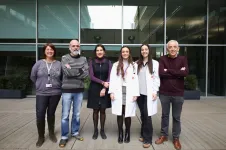(Press-News.org) Taking vitamin D supplements may help ward off dementia, according to a new, large-scale study.
Researchers at the University of Calgary’s Hotchkiss Brain Institute in Canada and the University of Exeter in the UK explored the relationship between vitamin D supplementation and dementia in more than 12,388 participants of the US National Alzheimer's Coordinating Center, who had a mean age of 71 and were dementia-free when they signed up. Of the group, 37 per cent (4,637) took vitamin D supplements.
In the study, published in Alzheimer's & Dementia: Diagnosis, Assessment & Disease Monitoring, the team found that taking vitamin D was associated with living dementia-free for longer, and they also found 40 per cent fewer dementia diagnoses in the group who took supplements.
Across the entire sample, 2,696 participants progressed to dementia over ten years; amongst them, 2,017 (75%) had no exposure to vitamin D throughout all visits prior to dementia diagnosis, and 679 (25%) had baseline exposure.
Professor Zahinoor Ismail, of the University of Calgary and University of Exeter, who led the research, said: “We know that vitamin D has some effects in the brain that could have implications for reducing dementia, however so far, research has yielded conflicting results. Our findings give key insights into groups who might be specifically targeted for vitamin D supplementation. Overall, we found evidence to suggest that earlier supplementation might be particularly beneficial, before the onset of cognitive decline.”
While Vitamin D was effective in all groups, the team found that effects were significantly greater in females, compared to males. Similarly, effects were greater in people with normal cognition, compared to those who reported signs of mild cognitive impairment – changes to cognition which have been linked to a higher risk of dementia.
The effects of vitamin D were also significantly greater in people who did not carry the APOEe4 gene, known to present a higher risk for Alzheimer’s dementia, compared to non-carriers. The authors suggest that people who carry the APOEe4 gene absorb vitamin D better from their intestine, which might reduce the vitamin D supplementation effect. However, no blood levels were drawn to test this hypothesis.
Previous research has found that low levels of vitamin D are linked to higher dementia risk. Vitamin D is involved in the clearance of amyloid in the brain, the accumulation of which is one of the hallmarks of Alzheimer’s disease. Studies have also found that vitamin D may provide help to protect the brain against build-up of tau, another protein involved in the development of dementia.
Co-author Dr Byron Creese, at the University of Exeter, said: “Preventing dementia or even delaying its onset is vitally important given the growing numbers of people affected. The link with vitamin D in this study suggests that taking vitamin D supplements may be beneficial in preventing or delaying dementia, but we now need clinical trials to confirm whether this is really the case. The ongoing VitaMIND study at the University of Exeter is exploring this issue further by randomly assigning participants to either take vitamin D or placebo and examining changes in memory and thinking tests over time.”
The VitaMIND study is run via PROTECT, an online study open to people aged 40 and over. In PROTECT annual questionnaires on detailed lifestyle factors combine with cognitive testing, to determine what keeps the brain sharp in later life. To find out more or to sign up, visit their website. In Canada, CAN-PROTECT, is a linked online study on aging, in people aged 40 and over, with an additional focus on caregiving in dementia.
The study is entitled ‘Sex, cognitive status, and APOE effects for vitamin D exposure and incident dementia’, and is published in Alzheimer's & Dementia: Diagnosis, Assessment & Disease Monitoring.
END
Taking vitamin D could help prevent dementia, study finds
Taking vitamin D supplements may help ward off dementia, according to a new, large-scale study.
2023-03-01
ELSE PRESS RELEASES FROM THIS DATE:
Checklist Prompters Support ICU Rounds
2023-03-01
Rounding checklists can help hospital care teams improve patient outcomes, and new research points to the potential for patient-specific checklists as a valid way to effectively translate the latest evidence into clinical practice.
These checklists can be helpful tools during daily rounds when multidisciplinary members of the patient care team convene to discuss each patient’s status and care plan. If too complex or generic, the checklists may instead become a burden, taking up valuable time with minimal impact.
One way to customize rounding checklists is to have an individual serve as a checklist prompter, listening to the conversation, eliminating ...
Home-based cardiac rehabilitation may help people live longer
2023-03-01
Research Highlights:
In a study of U.S. military veterans, researchers noted that participating in home-based cardiac rehabilitation was associated with a 36% lower risk of death compared to veterans who chose not to participate in cardiac rehabilitation.
Less than half of the study participants enrolled in rehabilitation, which focused on improving heart-healthy behaviors.
The research may be the first U.S. study to provide evidence of living longer with home-based cardiac rehabilitation in people with heart disease.
Embargoed until 4 a.m. CT/5 a.m. ET Wednesday, March 1, 2023
DALLAS, ...
Flamingos form cliques with like-minded pals
2023-03-01
Flamingos form cliques of like-minded individuals within their flocks, new research shows.
Scientists analysed the personalities and social behaviour of Caribbean and Chilean flamingos.
Birds of both species tended to spend time with others whose personality was similar to their own.
The study, by the University of Exeter and the Wildfowl & Wetlands Trust (WWT), reveals the complex nature of flamingo societies and could help in the management of captive flocks.
“Our previous research has shown that individual flamingos have particular ‘friends’ within the flock,” said Dr Paul Rose, from WWT and Exeter’s Centre for Research in Animal Behaviour.
“In ...
Social workers experienced depression, PTSD, and anxiety at alarming rates during pandemic
2023-03-01
Toronto, ON — A new study published in the journal International Social Work has uncovered concerning rates of depression, post-traumatic stress disorder (PTSD) and anxiety among social workers.
Stressors related to COVID-19 were the strongest factors associated with the negative mental health outcomes. Those who experienced a higher number of pandemic-related stressors — such as health concerns, increased caregiving responsibilities, violence in the home, family stress due to confinement, and stress associated with work-life balance — experienced mental health problems ...
Woodcocks have the brightest white feathers ever measured
2023-03-01
The mainly brown woodcock uses its bright white tail feathers to communicate in semi-darkness, reflecting 30% more light than any other known bird.
These surprise findings, by a team led by an Imperial College London scientist, suggest there is much to learn about how birds that are most active at night or at dawn and dusk communicate.
Birds that are most active during the day often have colourful plumages, which they use to communicate information with each other. Birds that are most active at dawn and dusk or at night (‘crepuscular’), such as nightjars and woodcocks, tend to have less showy plumage, as while sleeping during ...
Marker discovered which shows when a type of skin cancer is preparing to metastasise
2023-03-01
Cells that form cutaneous squamous cell carcinoma tumours prepare themselves to migrate to the lymph nodes to metastasise other organs, and they make changes so that they can survive this process. According to a study led by researchers from the Inflammatory and Neoplastic Dermatological Diseases Research Group at the Hospital del Mar Medical Research Institute, published in the journal Life Science Alliance, these cells stop consuming glucose so that they can survive by using LDL cholesterol molecules, the ...
Conversations about safe firearm storage at purchase can influence use of firearm locks
2023-03-01
Although cable locks – commonly distributed to prevent firearm injury and death – are included in many legal firearm purchases, research shows firearm owners rarely prefer or use these devices.
But a Rutgers study published in Injury Epidemiology found that gun owners who were told about cable locks at the time they purchased the firearm were more than twice as likely to use locking devices than those who weren’t told about cable locks when they made these purchases.
“Simply placing a cable lock in a bag when somebody purchases a firearm likely has minimal impact, but a simple discussion mentioning that a lock was included may make enough of an ...
Daily 11 minute brisk walk enough to reduce risk of early death, say Cambridge researchers
2023-03-01
One in ten early deaths could be prevented if everyone managed at least half the recommended level of physical activity, say a team led by researchers at the University of Cambridge.
In a study published today in the British Journal of Sports Medicine, the researchers say that 11 minutes a day (75 minutes a week) of moderate-intensity physical activity – such as a brisk walk – would be sufficient to lower the risk of diseases such as heart disease, stroke and a number of cancers.
Cardiovascular diseases – such as heart disease and stroke – are the leading cause of death globally, ...
Pink + pink = gold: hybrid hummingbird’s feathers don’t match its parents
2023-03-01
The Pink-throated Brilliant hummingbird, Heliodoxa gularis, has, unsurprisingly, a brilliant pink throat. So does its cousin, the Rufous-webbed Brilliant hummingbird, Heliodoxa branickii. When scientists found a Heliodoxa hummingbird with a glittering gold throat, they thought they might have found a new species. DNA revealed a different story: the gold-throated bird was a never-before-documented hybrid of the two pink-throated species.
John Bates, the senior author of a new study in the journal Royal Society Open Science reporting on the hybrid, first encountered the unusual bird while doing fieldwork in Peru’s Cordillera ...
Researchers identify three intestinal bacteria found in dementia with Lewy bodies
2023-03-01
Dementia with Lewy bodies (DLB), one of the most common forms of dementia, has no cure. Previous studies suggested that gut bacteria, the microorganisms that live in the human digestive tract, play a role in Parkinson’s disease, another neurodegenerative disorder, but the bacteria involved in DLB had not been identified. Now, a group led by researchers at the Nagoya University Graduate School of Medicine in Japan has identified three bacteria involved in DLB: Collinsella, Ruminococcus, and Bifidobacterium. Their findings, reported in npj Parkinson's ...
LAST 30 PRESS RELEASES:
Power in motion: transforming energy harvesting with gyroscopes
Ketamine high NOT related to treatment success for people with alcohol problems, study finds
1 in 6 Medicare beneficiaries depend on telehealth for key medical care
Maps can encourage home radon testing in the right settings
Exploring the link between hearing loss and cognitive decline
Machine learning tool can predict serious transplant complications months earlier
Prevalence of over-the-counter and prescription medication use in the US
US child mental health care need, unmet needs, and difficulty accessing services
Incidental rotator cuff abnormalities on magnetic resonance imaging
Sensing local fibers in pancreatic tumors, cancer cells ‘choose’ to either grow or tolerate treatment
Barriers to mental health care leave many children behind, new data cautions
Cancer and inflammation: immunologic interplay, translational advances, and clinical strategies
Bioactive polyphenolic compounds and in vitro anti-degenerative property-based pharmacological propensities of some promising germplasms of Amaranthus hypochondriacus L.
AI-powered companionship: PolyU interfaculty scholar harnesses music and empathetic speech in robots to combat loneliness
Antarctica sits above Earth’s strongest “gravity hole.” Now we know how it got that way
Haircare products made with botanicals protects strands, adds shine
Enhanced pulmonary nodule detection and classification using artificial intelligence on LIDC-IDRI data
Using NBA, study finds that pay differences among top performers can erode cooperation
Korea University, Stanford University, and IESGA launch Water Sustainability Index to combat ESG greenwashing
Molecular glue discovery: large scale instead of lucky strike
Insulin resistance predictor highlights cancer connection
Explaining next-generation solar cells
Slippery ions create a smoother path to blue energy
Magnetic resonance imaging opens the door to better treatments for underdiagnosed atypical Parkinsonisms
National poll finds gaps in community preparedness for teen cardiac emergencies
One strategy to block both drug-resistant bacteria and influenza: new broad-spectrum infection prevention approach validated
Survey: 3 in 4 skip physical therapy homework, stunting progress
College students who spend hours on social media are more likely to be lonely – national US study
Evidence behind intermittent fasting for weight loss fails to match hype
How AI tools like DeepSeek are transforming emotional and mental health care of Chinese youth
[Press-News.org] Taking vitamin D could help prevent dementia, study findsTaking vitamin D supplements may help ward off dementia, according to a new, large-scale study.




